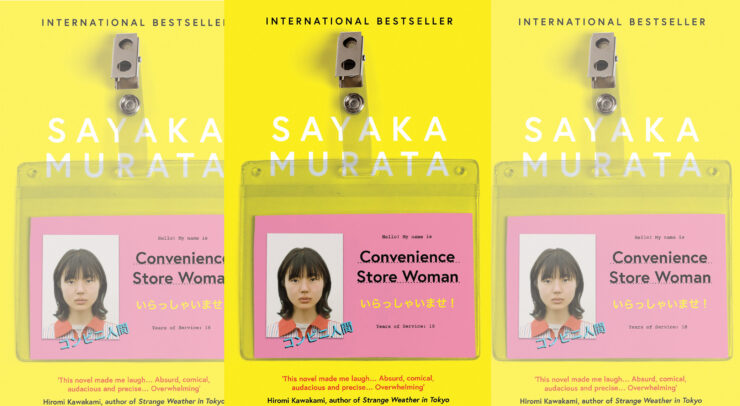In the Akutagawa prize-winning novel Convenience Store Woman, an eerie, offbeat story about 36 year-old part-time cashier Keiko Furukura, author Sayaka Murata obfuscates the line between reality and fantasy. Convenience Store Woman is a love story, but not in the orthodox sense—this is a love story not between Keiko and her eventual husband, but between herself and the store in which she has worked for 18 years.
Stepping into Murata’s convenience store gives off the peculiar feeling of having abandoned space and time—or at least the expected conventions of reality. The store is described as clean and well organized, the employees are eager, and management is approachable. The store, through Keiko’s eyes, gleams and excites and stimulates—but more importantly, it guides her through the processes of human interaction which she otherwise finds to be alien and distressing. In this regard, Murata’s deceptively sparse prose serves to make Keiko’s observations about society and the human condition particularly incisive and poignant.
Viewing herself as an outsider to humanity, she observes the people with whom she interacts—chiefly customers, fellow employees, and old school friends—as a scientist might, with a degree of distance and clinical interest. She alters her behaviours, patterns of speech, and dress style in imitation of these people so as to better demonstrate emotional nuances and appear “normal.”
Normal, because—as a child—she could not understand why someone’s dead pet budgie would not make a good meal. Normal, because upon witnessing her baby nephew’s tireless crying, she muses to herself that a kitchen knife would be useful in silencing him.
Keiko’s life orbits around the shifts that she works at the store: scripted and uniform, comfortingly menial, and reassuringly predictable. She anticipates the store’s every need, restocks and rearranges and refreshes, and she finds fulfillment.
It is almost utopic, until it isn’t. Keiko’s family and friends begin to question her commitment to the store when they think that she ought to be pursuing “normal” life ambitions, like a career or a husband—which problematizes Keiko’s function as a clerk. Hoping to reaffirm her normality, she proposes marriage to a middle aged, ugly, and destitute, ex-coworker who has been searching for a wife to end his perceived abuse at the hands of more successful men.
Their relationship is friendless, loveless, and sexless, and the facade it presents is ultimately futile, as Keiko’s sister soon discovers her deception. This forces Keiko to hold on even more desperately to her attempts to masquerade as normal.
Ultimately Keiko does not yield to society’s expectations of marriage and motherhood; on her way to interview for a “real” job, Keiko steps into a convenience store and, noticing all the ways in which it is sub-optimal—stock items arranged unintuitively, clerks working inefficiently—steps in to assist and experiences a kind of manic, euphoric revelation despite her difficulty understanding the why.
I won’t pretend that Keiko is a particularly likeable character—indeed, I (and likely many other readers) often found myself at odds with her. But a likeable character does not a good story make—and likeability does not necessarily have a bearing on relatability.
Keiko’s unwillingness to sacrifice the thing that brings her joy makes her, if nothing else, a remarkably self-actualized character, and one whom is due a certain measure of respect. Her idiosyncrasies, her blunt divergences from society, are at once refreshingly deliberate and alarming, but her stubborn antipathy for social mores is quietly revelatory and perhaps inspiring for those with a similar sense of disconnect.
If you like a protagonist who keeps to their convictions, and if you like your books to challenge and disturb you—all the while leaving you satisfied—Convenience Store Woman is your next read.





